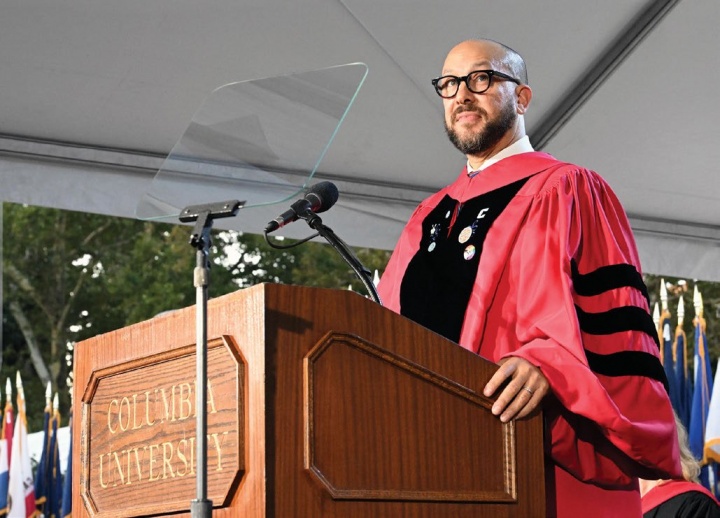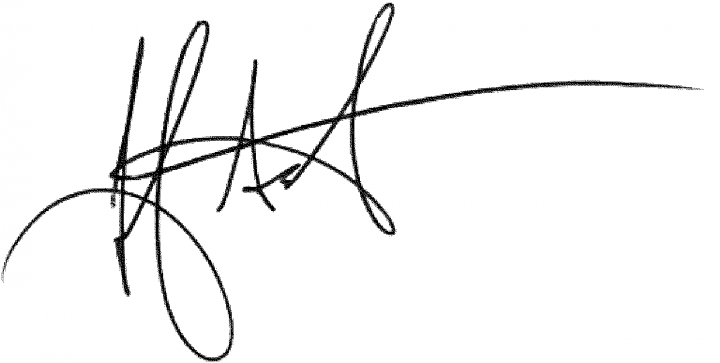Columbia College | Columbia University in the City of New York
The Pursuit of the Good, Beautiful and Just

Eileen Barroso
On the occasion of this new beginning, I’d like to share words from the Greek poet Sappho, taken from Anne Carson’s translation, If Not, Winter, which first-year students will encounter this fall in Lit Hum. The poems of Sappho survive in fragments, leaving tantalizing gaps and blank spaces with only the reader’s imagination to fill them. The fragment I’d like to focus on reads as follows:
I want to say something but shame
prevents me
yet if you had a desire for good or beautiful things
and your tongue were not concocting some evil to say,
shame would not hold down your eyes
but rather you would speak about what is just.
Goodness. Beauty. Justice. Perhaps the most important thing one does as an undergraduate is engage with and build a thriving community among peers from different backgrounds, with divergent life experiences, and with many of whom you may appear to have little, if anything, in common.
More than any major you choose, club you join, internship you land or research project you pursue, learning from each other, living with each other and navigating the unfamiliar and unpredictable will be the cornerstones of your College life. I can say with confidence that what you encounter and confront here on this campus, during these years, will definitively shape the paths you make for yourselves in the decades to come.
Our job is to ensure that all of our students have spaces and language to ask questions, that you are invited and empowered to take risks and make mistakes as you pursue your curiosity, and that you recognize your value to one another and to the larger community. Facilitating this holistic experience — encompassing the curricular, co-curricular and extracurricular — is a defining feature of the College’s mission.
We live in a time of change and upheaval, where many things taken for granted are being challenged. But there are some things that do not change, that must not change. The convergence of disparate ideas, cultures, religions, ideologies and identities you represent is an essential source of strength for our community — and our commitment to fostering and sustaining such an environment is unwavering.
The locus and living embodiment of this commitment to diversity of thought, dialogue and exploration is the Core Curriculum. Each of you will encounter and debate ideas — about equality, authority and difference — that challenge both you and your professors. Your views of yourself and the world will evolve. But none of this will happen in a vacuum.
You will not, and cannot, do it alone. The Core does not work without forthright collective engagement with difference of opinion, of viewpoint and interpretation. It is not easy, and the individual achievement many of you are used to striving for will not be the mark of success in this arena.
Across the syllabi of the Core Curriculum one finds competing ideas rather than a clear consensus. Students and faculty are invited to join in a culture of free inquiry, and to forge an informed independence of mind. Even still, in the face of these fragments, a clear theme recurs: The proper context, and end, for the pursuit and acquisition of knowledge is community. The Core, at its best, both raises this query and models this ideal.
The pursuit of knowledge in community is not the pursuit of certainty, but the pursuit of more questions. You must get comfortable with multiple conflicting interpretations and an ability to live in — or move through — a grey, liminal space where there may not be an obvious right or wrong answer. Only more questions.
The enduring value of your liberal arts education will be the habits of mind you develop, and the skills for critical, creative and collective intellectual inquiry that you hone. These skills cannot be quantified with grades or test scores, much the same way it is impossible to quantify the value of each member of the community that will help you build them. If we do our jobs right, these habits of mind will become a living part of your intellect and a framework for engaging with the world long after you leave campus.
Like the fragments of Sappho’s poetry, it is for you to fill in the blank spaces of the future where there are rarely certain answers. You must fill them with your own imagination, your own experience and your own curiosity — and marvel at the myriad and often surprising ways that others choose to fill in those same blanks.
I implore you to revel in your differences, celebrate the power of the new ideas they can reveal and recognize each other’s unique contributions to our community. Hold fast to your curiosity, and the questions that drive you. Respect and nurture these same qualities in others, and remember that you need never be ashamed to hold your head high and look forward with clear eyes in the pursuit of good, beautiful and just things.

Josef Sorett
Dean of Columbia College and the Henry L. and Lucy G. Moses Professor
Vice President for Undergraduate Education
Professor of Religion and African American & African Diaspora Studies
Issue Contents
Published three times a year by Columbia College for alumni, students, faculty, parents and friends.
Columbia Alumni Center
622 W. 113th St., MC 4530, 6th Fl.
New York, NY 10025
212-851-7852
cct@columbia.edu
Columbia Alumni Center
622 W. 113th St., MC 4530, 4th Fl.
New York, NY 10025
212-851-7488
ccalumni@columbia.edu

